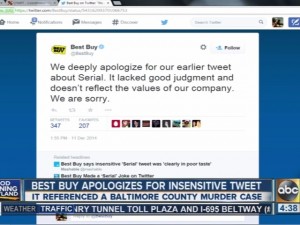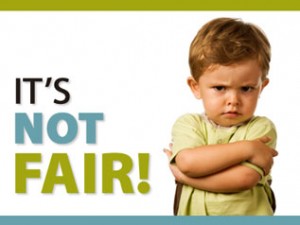
One thing that many people often overlook when encountering a corporation on social media is that there is a single human being attached to the tweet, update, or blog that they are reading. This link shows what can happen when someone in charge of a corporate social media outlet goes too far, or posts content that is too personal. The problem, from a corporate standpoint, is how to generate content on social media that manages to attract new customers without offending their existing customer base. In other words, what corporations seek to achieve is a social media presence that almost perfectly mimics the social media presence of an individual yet inherently lacks the actual freedom of speech held by individuals.
The responsibility, of course, lies with the content creators. A single lapse of judgement can easily lead to being fired if one is in charge of a corporate social media outlet today. One must never forget who they are representing when posting online.
Below is a tweet earlier this week in reference to a popular true crime podcast called Serial.

Within minutes of this tweet, many thousands of users on twitter attacked Best Buy for what many considered to be a crass exploitation of a tragic situation (the murder of a young woman in Baltimore in 1999). They then deleted the tweet and offered the below pictured apology.

Did Best Buy go too far? On one hand, they did indeed make a joke about a tragic situation, but what many people failed to take into account is the fact that the Serial podcast, which has been downloaded by over 5 million people, is in and of itself, a form of entertainment. Furthermore, the huge amount of attention the podcast has received has pushed the entire case into the realm of popular culture. This is an important distinction to make because the question now becomes, did Best Buy make a joke about a tragedy in order to sell products, or did they make a joke about a pop culture phenomenon? I think the person behind the Best Buy social media ultimately helped Best Buy’s reputation. The apology leaves Best Buy in a position they can defend, yet the controversy created only enhanced their brand presence overall.

The benefits of corporate blogging definitely outweigh the risks, but only for the corporation. For the individual employee, the opposite is true. While they may be fairly financially compensated for their work, there is always the risk that something they post will either offend the company’s customer base, or the company itself. While it is unclear from the Best Buy example above, it is almost certain that the employee who wrote the offending tweet will be punished while the company is almost certain to prosper.

Another important issue is whether or not employers should be able to access and make decisions based upon an employees social media presence. The answer really depends upon the individual. The web offers plenty of advice on how to navigate this terrain, yet the answers seem unsettling. Advice such as “remove every potentially-inappropriate post/picture” and to “keep language and grammar in mind,”(Driscoll) seems to be at odds with an individual’s right to freely and openly communicate. While self-censorship is an important and integral part of interacting with society, it can be taken too far. At a certain point, an individual loses their individuality if they are more concerned with continued employment than speaking their mind. “A public profile is a vehicle for casually interacting with others in an informal setting, on personal free time. When companies use these profiles to find not only a professional but also an ideological match for a job, they’re misleading themselves and building ill will with talented prospective employees, who might decline to apply for a job for fear a comment about China on their blogs makes them persona non grata”(Fish). While keeping individual social media outlets private seems like good, practical advice, it kind of defeats the purpose of “social” media. Allowing employers to dictate what you do and don’t post online allows them to, in effect, shape the internet itself. Is this something that we want to happen?
Sources Cited:
Driscoll, Emily. “What Your Social Media Reputation Says to Employers.” Fox Business. 3 June 2013. Web. 29 Aug. 2014. <http://www.foxbusiness.com/personal-finance/2013/06/03/what-your-social-media-reputation-says-to-employers/>.
Fish, Greg. “Employers, Get Outta My Facebook.” Business Week. Bloomsburg, 20 Mar. 2008. Web. 28 Aug. 2014. <http://www.businessweek.com/debateroom/archives/2010/12/employers_get_outta_my_facebook.html>.
Warren, Christina. “10 People Who Lost Jobs Over Social Media Mistakes.” Mashable. 16 June 2011. Web. 29 Aug. 2014. <http://mashable.com/2011/06/16/weinergate-social-media-job-loss/>.
I chose to read your response because your title was intriguing. It immediately raised the questions: What do we lose? Who is “we”? And how could it possibly be us losing anything when corporations are the ones at risk for using social media?
Your blog also raised differing thoughts and further questions:
How are corporations the only ones whose benefits outweigh the risks? You provided an explanation of only how employees’ risks outweigh the benefits – I agree for the reasons that you stated: risky posts that will offend the customer base or the company itself and by extension, the result of termination.
Should employers be able to access and make decisions based upon an employee’s social media presence? Respectfully, I disagree that it depends on the individual. I do not think that it should be contingent upon each person because all persons should be treated equally.
I agree that your link to the advice on how to create a more positive online reputation is unsettling; to “remove every potentially-inappropriate post/picture” (Driscoll) is a vague suggestion and considered subjective. For example, what is appropriate to an employee may not be considered appropriate to an employer, such as a picture with a politician. It may be seen as an inappropriate reflection of the company’s political views; however, to the employee, it’s simply a picture with a political icon. Therefore, should there be a universal comprehensive list of inappropriateness for employers and employees to follow?
What your blog post really made me think about is whether or not employers should give incentives to employees to refrain from social media. If so, what kind?
Thanks for sharing!
Sources Cited:
Driscoll, Emily. “What Your Social Media Reputation Says to Employers.” Fox Business. 3 June 2013. Web. 31 Aug. 2014. .
I think the main point you are trying to establish in your response to this week’s article is very interesting. Weblogs may be very beneficial to the industries or companies that are trying to promote their image or get feedback from a wide audience instead of engaging in market research, but at the same time weblogs are also be damaging to some other people. You are right in saying that the employees of a certain company, for instance, are the first to be touched by this issue, as they need to conform to their company’s rules or guidelines at the expenses of what they truly believe or think. Personally, I would not like to become a puppet who does not think with her own brain, and if this is one of the effects of marketing blogging, we should try to contain its negative results because, as you stated at the end of your post, we do not really want this to happen. Another negative effect that you also underlined is that being truthful to oneself may lead to dreadful consequences for the employees. Being fired for simply stating an opinion is obviously unfair and harmful to one’s physical and psychological health. However, I understand that big industries have the right to protect their image. Therefore, if one of their employees crosses the line in a way that causes an unquestionable damage to the industry’s reputation, I believe that the industry involved in this negative advertisement does have the right to do what it takes to defend its brand.
I really enjoyed reading your blog about the relationship between social media and corporations. Social media has certainly become a hugely influential factor in the business world; unfortunately, some aspects can be risky, even detrimental, to the individual blogger or corporation. Your title was the first thing to draw me to your blog post. “What we lose when corporations control social media” is a great title and something that I have thought about a lot pending my imminent cross over from student to working adult. Social media are outlets to express your individualism but with corporations focusing a chunk of their recruiting/scouting on these outlets, individuals could potentially find it hard to maintain a professional persona. However, I do not agree that individuals should hide or act less like themselves just because corporations expect everyone to be a certain way. Of course, there is a certain set of moral and ethical guidelines that everyone already accepts and adheres too, but anything past that should be left to the discretion of the individual. Just as the saying goes, “you can’t judge a book by its cover”, you cannot judge an individual just off the perception he/she gives from their social media. It is an unfortunate dilemma, further discussed by Emily Driscoll when she states, “But now with social media, job candidates are being fully examined before even stepping foot into a human resources department,” which I believe is just completely unacceptable. Nonetheless, I agree with the link you posted offering advice on how to clean up your social media outlets because, whether we like it or not, corporations will continue to examine them. Driscoll advises future employees to “Google yourself”, “Don’t rely on privacy settings”, “Remove every potentially inappropriate post/picture”, and “Keep language and grammar in mind”. Her last piece of advice I find particularly important because it applies to real world job etiquette. I agree with your statement that “a single lapse of judgment can easily lead to being fired if one is in charge of a corporate social media outlet today. One must never forget who they are representing when posting online” (Mennis). You should always be mindful of what you are saying because any negative feedback or talk could make the corporation as a whole look bad.
Sources Cited
Driscoll, Emily. “What Your Social Media Reputation Says to Employers.” Fox Business. 3 June 2013. Web. 31 Aug. 2014. .
Mennis. “What We Lose When Corporations Control Social Media.” Web. 29 August 2014